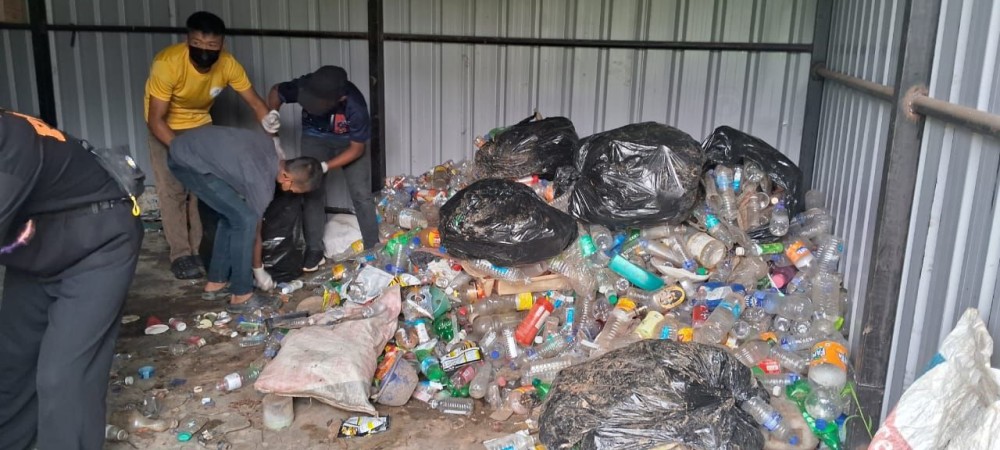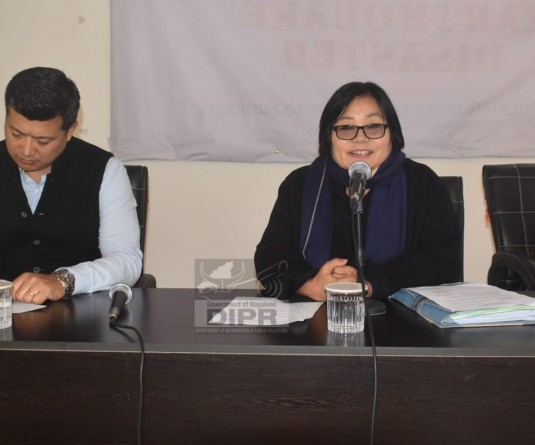Volunteers sort and store collected plastic bottles and waste at the Plastic Waste Management Unit in Chunlikha Block during the “Har Ghar Tiranga, Har Ghar Swachhata” community clean-up drive on August 9.

Kohima, August 9 (MExN): The Kohima Rural Division, in collaboration with the District Administration Tseminyu, Kithagha Students’ Union and Tseminyu District Green Initiatives conducted a community clean-up and plastic waste segregation drive at the Plastic Waste Management Unit (PWMU) in Chunlikha Block as part of the “Har Ghar Tiranga, Har Ghar Swachhata” campaign on August 9.
The programme aimed to raise awareness on the growing challenge of waste management, blending patriotism with community-led cleanliness actions in the run-up to the 79th Independence Day.
Special guest Kikum Sungla Jamir, Additional Deputy Commissioner and Convenor of Tseminyu Green District Initiatives, said in her keynote address that the “Har Ghar Tiranga, Har Ghar Swachhata” campaign is a joint initiative of the Department of Drinking Water & Sanitation, Ministry of Jal Shakti, and Ministry of Culture.
She urged village leaders, councils and students to “adopt the habit of cleanliness and reducing plastic waste at its source” and to ensure that government assets such as the PWMU, constructed by the Department of PHE, Kohima Rural Division, “are made fully operational for the benefit of public health and the environment.” She lauded the vision of the Tseminyu Green District Initiative and expressed hope that “other districts would replicate this model across the state.”
Earlier, District Coordinator, PHED Kohima Division, Ashale Seb, spoke on types of plastics and waste management practices. She described plastic as having a double-edged nature, saying that while it is “lightweight, durable, affordable, and widely used in packaging, household goods, electronics, and medical supplies,” it also poses “long-term environmental and health hazards due to its non-biodegradable nature.”
She pointed out that some plastics are unsuitable for shredding due to toxicity, contamination or multi-layered composition, and stressed the need to “promote segregation at source, where households and institutions separate recyclable plastics from non-recyclables.”
Co-Convenor of Tseminyu Green District Initiatives, Zukeya Woch, highlighted that achieving a “green model village” requires sustained efforts from government agencies, NGOs, student bodies, youth groups and church organisations. “True cleanliness means preventing plastic waste from polluting backyards, streams, and rivers, and this must become a habit for communities,” he stated.
The programme was chaired by Jesenlo Seb, President of the Kithagha Students’ Union, who expressed gratitude to the PHED and District Administration, Tseminyu, for their leadership in the initiative. Pastor Nikeya Tep of Kithagha Baptist Church invoked blessings for the programme and its activities.
Following the formal session, volunteers carried out clean-up and segregation activities along nearby streams, highway stretches and public areas, collecting mineral water bottles and other plastic waste. The collected materials were sorted and stored at the Chunlikha Block PWMU.
A truckload of plastic waste was gathered, but the total weight could not be measured due to the absence of a weighing machine.




